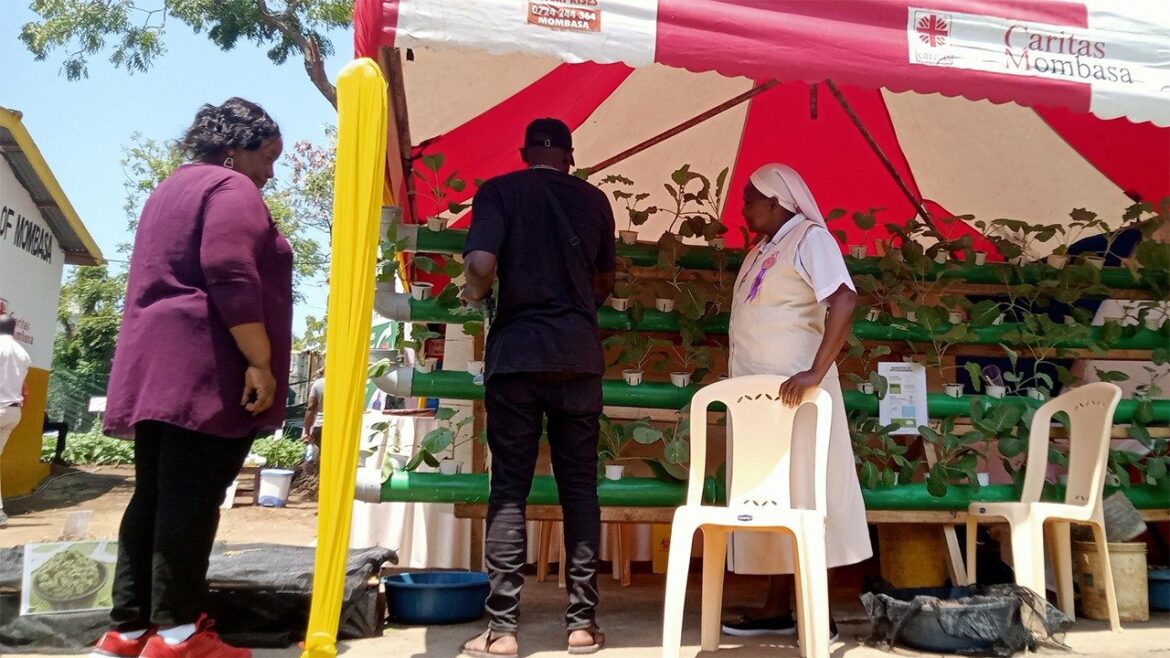Community empowerment through sustainable farming drives Sr. Josephine Kwenga’s work to help farmers in Kenyan villages develop viable farming practices in order to bring new life to families and the Church’s mission of care for creation.
By Sr. Christine Masivo, CPS
Sr. Josephine Kwenga, a religious sister of St. Joseph of Tarbes, transforms lives in a way that unites faith, sustainability, and community empowerment.
Sustainable farming is bringing new life to families, communities, and the Church’s mission of care for creation in line with her passion.
Holistic ministry
In 2023, Sr. Josephine was honored with a recognition certificate from the United Nations Journalists and Writers Foundation for her work in sustainable farming. Her witness as a religious woman, and her prophetic role in society today blend her passion for ministry.
“I am passionate about teamwork and promotion of holistic development and social transformation,” she told Vatican News. “Our ministry is not about amassing resources; it is about community empowerment, scheduling programs that assimilate faith and sustainability, and being a resource for those we serve.”
Sr. Josephine is equipped to guide development initiatives with her unique academic background in education, development studies, and social transformation, specializing in sustainable development, peacebuilding, leadership, and project management.
Farming as a spiritual act
Farming is more than food production, believes Sr. Josephine. It is union with the creator in action. “When we nurture the soil and care for plants and animals, we are participating in God’s creative work,” she said.
“We learn patience, trust, and humility. It connects us with the rhythm of life; when we sow, wait, nurture, and harvest, it mirrors the journey of faith, and so farming becomes a prayer for the gift of creation,” she explained.
This vision has a profound impact on farmers who often see their work as menial or burdensome. Working side by side with the farmers in the fields has made Sr. Josephine to break barriers of perception.
“At first, many farmers are surprised to see a sister in a habit holding a garden hoe,” she said. “But soon, the surprise turns into respect. The farmers say when they see the sisters teach them how to be great farmers, they are encouraged because it shows their work is dignified in the eyes of God and the Church.”
Stories of transformation
Sr Josephine shared a story of transformation in the work that she does. In her region, some farmers were so poor they had to rent simple tools, spending half their daily wages just to work in other people’s fields. “After joining the sisters’ sustainable farming program, they not only acquired their own tools but also began growing their own food, even producing a surplus for sale,” she said.
“Today, some of them even have milk goats,” she noted with pride. “What began as survival has become dignity, hope, and a better future. This gives me joy and confidence, as farming has restored their lives.”
Challenges and perseverance
“Farmers struggle to believe that things can be different,” Sr. Josephine admitted. Added to this are resource constraints and setbacks such as droughts and crop failures.
What sustains her through these challenges is prayer and community. “I do not carry the burden alone,” she said. “I bring my struggles back to my religious community. We pray together for our ministry and strategize on how to respond. With God, creativity, and persistence, transformation is possible.”
Blending tradition, technology, and faith
Modern farming can be viewed as inseparable from technology and climate change. Yet, believes Sr. Josephine, “innovation must serve life, not replace it.”
Inspired by Laudato si’ and Fratelli tutti, she assimilates modern methods in irrigation, soil conservation, and climate-smart farming with traditional organic practices.
“It is about preserving what is life-giving from tradition, discarding what is harmful, and using technology in ways that respect creation and the dignity of the farmer,” she explained. “We evangelize technology, not vice versa.”
The hidden strength of women religious
Sr. Josephine embodies what she calls “the hidden power of presence.”
“Our visionary voice is not in loud speeches,” she said, “but in consistent actions that restore dignity, build communities, and care for creation. Transformation does not always come from positions of authority but from compassion and service. This is the quiet but powerful witness of women religious.”
“When we join religious life, we come with openness and readiness to respond to the needs of the mission,” she said. “You may be trained as a teacher but find yourself called to farming or another field. What matters is responding to the signs of the times with faith and generosity. That is where fulfillment lies.”
Dreams for the future
Looking ahead, Sr. Josephine dreams of a future where farming is seen not as lowly work, but as a dignified vocation. “We all eat food; farming sustains all of us. I want farmers to embrace their role with confidence and pride, and for the Church to stand closely with them not just as a voice, but as a partner in action,” she shared.
She dreams of promoting organic, regenerative farming so that future generations inherit land richer than before. “When families have food security, there is peace in homes and harmony in communities,” concluded Sr. Josephine. “Many wars, even global ones, stem from scarcity of resources. If we address this, we build true peace.”





